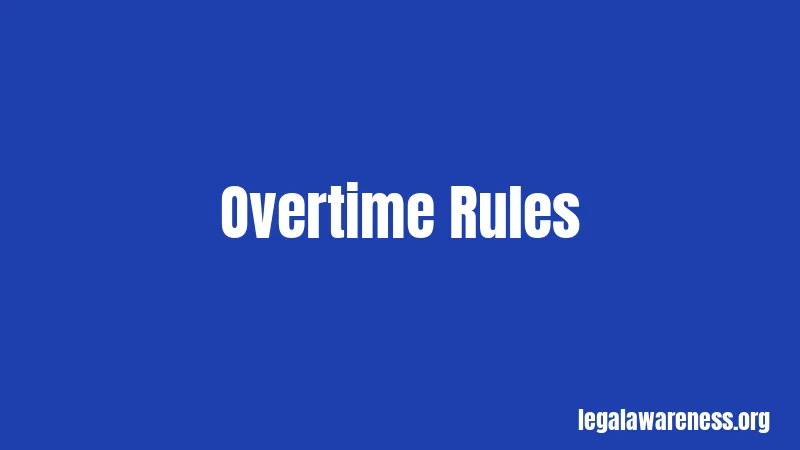Employment Laws in Tennessee (2026): Your Essential Guide
Most people assume employment laws are the same everywhere. They’re not. Tennessee has its own set of rules, and if you work here or run a business here, you need to know them.
This guide breaks down everything from minimum wage to termination rights. Let’s dive in.
What Are Employment Laws?

Employment laws are the rules that protect workers and guide employers. They cover everything from pay to workplace safety to discrimination.
Tennessee follows many federal laws but also has state-specific rules. Some areas are actually more worker-friendly than you’d think. Others? Well, employers have a lot of freedom here.
Minimum Wage in Tennessee
Here’s the deal. Tennessee doesn’t have its own minimum wage law.
That means the federal minimum wage applies. Right now, that’s $7.25 per hour. It’s been that rate since 2009, and honestly, it hasn’t changed in a long time.
Most employers covered by the Fair Labor Standards Act must pay at least $7.25. Some workers are exempt from this requirement. These include executive and professional employees who earn a salary. Outside sales employees also don’t have to receive minimum wage.
Tipped Workers
Wondering if this applies to servers and bartenders? Good question.
Tennessee allows employers to pay tipped workers as little as $2.13 per hour. But there’s a catch. The tips plus the hourly wage must add up to at least $7.25 per hour.
If tips don’t cover the difference, the employer has to make it up. Tipped employees are workers who regularly earn at least $30 per month in tips.
Overtime Rules

Tennessee doesn’t have state-specific overtime laws. So federal rules apply here too.
Under the Fair Labor Standards Act, non-exempt employees must get overtime pay. That’s 1.5 times their regular rate for hours over 40 in a workweek.
Who’s Exempt from Overtime?
Not everyone gets overtime. These workers are typically exempt:
Executive, administrative, and professional employees who meet salary requirements. As of January 2025, anyone earning at least $1,128 per week or $58,656 per year is considered exempt.
Outside sales employees don’t get overtime either. Some commissioned employees are also exempt. Computer employees earning at least $27.63 per hour fall into this category too.
Pretty straightforward, right?
Break and Meal Period Requirements
Hold on, this part is important.
Tennessee requires employers to provide a 30-minute unpaid break. This applies when employees work six consecutive hours.
There’s an exception though. Some jobs naturally provide opportunities for breaks throughout the day. Restaurant workers and security guards often fall into this category.
The break doesn’t count toward overtime calculations. It’s unpaid, so employees aren’t on the clock during this time.
Wondering if you need more breaks? State law doesn’t require additional ones. But breaks under 20 minutes, if given, must be paid.
At-Will Employment

Okay, pause. Read this carefully.
Tennessee is an at-will employment state. This is huge for both employers and employees.
What does this mean? Employers can fire employees at any time, for any legal reason, or for no reason at all. Employees can also quit anytime without notice.
But wait, there’s more to know.
Exceptions to At-Will Employment
At-will doesn’t mean employers can do whatever they want. Several important exceptions exist.
Employers cannot fire someone based on discrimination. Race, color, religion, sex, national origin, age, or disability are all protected characteristics.
Retaliation is also illegal. You can’t fire someone for reporting illegal activity. This includes whistleblowing, filing workers’ compensation claims, or participating in workplace investigations.
Employment contracts change things too. If you have a written contract specifying termination terms, those terms must be followed.
Public policy violations are another exception. Firing someone for serving on a jury is illegal. So is terminating someone for refusing to commit an illegal act.
Anti-Discrimination Laws
Tennessee takes workplace discrimination seriously. Several laws protect workers here.
Tennessee Human Rights Act
This state law prohibits discrimination based on:
Race, creed, color, religion, sex, age, or national origin. It applies to employers with eight or more employees.
Notice something? That’s actually broader coverage than federal law. Federal anti-discrimination laws typically apply to employers with 15 or more employees.
Tennessee Disability Act
This law protects workers with disabilities. Employers must make reasonable accommodations for employees who can perform essential job functions.
The Crown Act
Tennessee’s Crown Act is pretty recent. It prohibits discrimination based on hairstyles associated with particular ethnicities.
Honestly, this law makes sense. It addresses a real issue many workers face.
Payroll and Wage Payment
Let’s talk about when you get paid.
Tennessee has specific rules about payroll timing. Employers must follow these requirements.
Wages earned by the first of the month must be paid by the 20th of the following month. Wages earned by the 16th day of the month must be paid by the fifth day of the next month.
Employers must also post payday notices in at least two visible locations. Regular paydays are required.
Final Paychecks
When employment ends, timing matters.
Final paychecks must be paid by the next regular payday. Or within 21 days of termination. Whichever comes later.
This applies whether you quit or were fired. The final check must include all earned wages.
Wondering about unused vacation time? It depends. Tennessee doesn’t require payout unless company policy or an employment contract says otherwise.
Employers who fail to pay on time face penalties. This includes fines up to $500 per offense. Willful violations can result in penalties up to $1,000.
Leave and Time Off
Here’s where things get interesting.
Tennessee doesn’t require private employers to provide paid leave. Seriously. No paid vacation, sick leave, or holiday pay is mandated by state law.
What Employers Must Provide
Actually, very little. Most leave benefits come from federal law or employer choice.
The Family and Medical Leave Act applies to larger employers. Companies with 50 or more employees must provide up to 12 weeks of unpaid leave yearly. This covers serious health conditions, new child care, and military family leave.
Veterans Day Leave
Tennessee does require one specific leave. Veterans must be allowed to take November 11th off as an unpaid holiday.
But there’s a catch. The veteran must provide at least one month’s written notice.
What Employers Often Provide
Most Tennessee employers do offer some benefits. These typically include vacation time, sick leave, and holiday pay.
If an employer offers these benefits, they must follow their own policies. The employee handbook becomes the governing document.
Many companies now offer PTO (Paid Time Off). This combines vacation and sick time into one pool.
Workers’ Compensation
Now, here’s where things get serious.
Tennessee requires most employers to carry workers’ compensation insurance. This protects employees injured on the job.
Who Must Have Coverage
The rules depend on your industry.
Most employers need coverage once they have five or more employees. This includes full-time, part-time, and family member employees.
Construction industry employers must have coverage with just one employee. Coal mining businesses also need coverage starting with one employee.
What’s Covered
Workers’ compensation covers several things. Medical expenses for work-related injuries come first. This includes emergency room visits, surgery, and prescriptions.
Ongoing care is also covered. Physical therapy and pain management fall into this category.
Partial wage replacement is another benefit. Workers typically receive two-thirds of their average weekly wages while recovering.
Death benefits are available if the worst happens. These cover funeral costs and provide support for the worker’s family.
Penalties for Non-Compliance
Not having required coverage? Bad idea.
Fines can reach $10,000 or more. A 25% penalty applies for failing to pay temporary disability benefits.
If an employee gets hurt and you don’t have coverage, they can sue you. The damages could exceed what workers’ comp would have paid.
Child Labor Laws
Tennessee protects young workers. Anyone under 18 is considered a minor.
Minimum Age
The minimum age for employment is 14. But strict rules apply to young workers.
Work Hour Restrictions
For 14 and 15-year-olds, limits are strict. When school is in session, they can’t work during school hours. They can’t work later than 7 PM on school nights.
When school is out, they can work until 9 PM. Maximum hours are eight per day and 40 per week during summer.
For 16 and 17-year-olds, rules are less restrictive. They can’t work between 10 PM and 6 AM on school nights. With parental consent, they can work until midnight up to three nights weekly.
Prohibited Jobs
Certain jobs are completely off-limits for minors. These include establishments where alcohol sales exceed 25% of gross receipts. Hazardous occupations are also prohibited.
E-Verify Requirements
Tennessee requires employment verification. The Tennessee Lawful Employment Act governs this.
Since January 2023, employers with 35 or more employees must use E-Verify. This federal system confirms work authorization.
Smaller employers can choose E-Verify or maintain copies of identification documents.
New Hire Reporting
Employers must report new hires to the state. This report goes to the Department of Labor and Workforce Development within 20 days of hiring.
Drug-Free Workplace Programs
Here’s something many people don’t realize.
Tennessee allows employers to implement drug-free workplace programs. These programs come with benefits for employers.
Participating employers get a discount on workers’ compensation insurance premiums. A 5% credit is typical.
Testing Requirements
Employers can require drug and alcohol testing. This applies to job applicants and current employees.
Anyone who tests positive must be terminated. Unless the positive result comes from prescribed medication taken in the last six months.
Employees who refuse testing forfeit workers’ compensation benefits. This includes medical and wage replacement benefits.
Employee Notifications
Employees must be notified about the drug-free policy. They need to know that working or reporting to work with drugs or alcohol in their system is prohibited.
Right to Work State
Tennessee is a right-to-work state. This affects union membership.
Employers cannot require union membership as a condition of employment. Employees can’t be forced to pay union dues either.
This gives workers more choice about union participation. But it also affects union strength and bargaining power.
Workplace Safety
Tennessee takes safety seriously. The state has its own OSHA program.
TOSHA
The Tennessee Division of Occupational Safety and Health oversees workplace safety. TOSHA enforces both federal and state safety standards.
Tennessee’s standards meet or exceed federal requirements. Employers must maintain safe work environments.
Safety Committees
Some employers must establish safety committees. If your Experience Modification factor exceeds 1.20, a safety committee is required.
The committee must remain active until the factor drops below 1.20.
Termination and Separation
Let’s talk about the end of employment.
Notice Requirements
Generally, Tennessee doesn’t require advance notice for terminations. Remember, it’s an at-will state.
But mass layoffs are different. The federal WARN Act requires 60 days’ notice for large-scale layoffs.
Separation Notices
Employers must provide a separation notice. Form LB-0489 must be given within one day of separation.
There’s an exception. If employment lasted less than a week, or if the employee will be recalled within a week, no notice is needed.
Severance Pay
Tennessee doesn’t require severance pay. But many employers offer it anyway.
If severance is offered, it must follow company policy or the employment agreement.
Unemployment Insurance
Workers who lose their jobs may qualify for unemployment benefits.
The Tennessee Department of Labor and Workforce Development handles unemployment insurance. Even employees fired for some reasons may still qualify.
Eligibility depends on several factors. The department evaluates each case individually.
Special Protections
Tennessee law provides additional protections for certain activities.
Jury Duty
Employers cannot fire employees for serving on juries. In fact, employers must pay regular wages during jury service. The court’s compensation can be deducted.
Whistleblower Protections
The Tennessee Whistleblower Law protects employees who report violations. You can’t be fired for disclosing that your employer is breaking the law.
This applies whether you report internally or externally. Testifying about violations is also protected.
Military Service
Employees called to military service have job protection. Employers cannot terminate or discriminate against service members.
Recent Changes
Employment law evolves constantly.
As of January 2025, the exempt employee salary threshold increased. Workers earning at least $1,128 weekly or $58,656 annually are now considered exempt from overtime.
The E-Verify threshold also changed recently. As of January 2023, employers with 35 or more employees must use the system. Previously, the threshold was 50 employees.
Tennessee continues to update its labor laws. Staying informed is crucial for both employers and employees.
How to File Complaints
Think your rights were violated? You have options.
State Agencies
The Tennessee Department of Labor and Workforce Development handles many complaints. This includes wage and hour violations.
The Tennessee Human Rights Commission addresses discrimination complaints. Employers with eight or more employees fall under their jurisdiction.
Federal Agencies
The Equal Employment Opportunity Commission handles federal discrimination claims. You have 180 days to file with the EEOC for most claims. If state law also applies, you may have up to 300 days.
The U.S. Department of Labor addresses federal wage and hour issues.
Legal Action
You can also hire an employment attorney. Many employment lawyers offer free consultations.
Time limits apply to most claims. Don’t wait too long to take action.
Resources for Employees
Need more information? Several resources can help.
The Tennessee Department of Labor and Workforce Development website provides detailed information. Their phone line at (800) 332-2667 connects you with the Ombudsman Program.
The Tennessee Human Rights Commission offers guidance on discrimination issues. They’re located in Nashville.
Free legal aid may be available for low-income workers. Check with Tennessee Legal Services or local bar associations.
Resources for Employers
Employers need reliable information too.
The Tennessee Department of Labor and Workforce Development offers employer resources. This includes guides on compliance and reporting requirements.
Business attorneys specializing in employment law can provide personalized guidance. Consider consulting one before making major policy changes.
Professional employer organizations can help manage compliance. These services are especially helpful for smaller businesses.
Frequently Asked Questions
What is Tennessee’s minimum wage in 2026?
Tennessee follows the federal minimum wage of $7.25 per hour. The state doesn’t have its own minimum wage law, so federal standards apply to most employers.
Can my employer fire me for any reason in Tennessee?
Tennessee is an at-will employment state. Employers can generally fire employees for any legal reason or no reason at all. However, terminations based on discrimination, retaliation, or contract violations are illegal.
Do I get paid breaks in Tennessee?
Tennessee requires a 30-minute unpaid break for employees working six consecutive hours. Breaks under 20 minutes, if provided, must be paid. But additional breaks aren’t required by law.
Does Tennessee require paid sick leave?
No. Tennessee doesn’t require private employers to provide paid sick leave. Federal law (FMLA) may provide unpaid leave for eligible employees, but state law doesn’t mandate paid sick time.
When must my employer give me my final paycheck?
Your final paycheck is due by the next regular payday or within 21 days of termination, whichever comes later. This applies whether you quit or were fired.
Do small businesses need workers’ compensation insurance?
It depends. Most Tennessee employers need coverage once they have five employees. Construction and coal mining businesses need coverage starting with one employee.
Can my employer require drug testing?
Yes. Tennessee allows employers to require drug and alcohol testing. Many employers implement drug-free workplace programs to receive workers’ compensation premium discounts.
What should I do if I’m discriminated against at work?
File a complaint with the Tennessee Human Rights Commission or the EEOC. You typically have 180 to 300 days to file. Consider consulting an employment attorney for guidance.
Are minors allowed to work in Tennessee?
Yes, but with restrictions. The minimum working age is 14. Strict rules govern hours and prohibited occupations for workers under 18.
Can I be fired for reporting illegal activity?
No. Tennessee’s Whistleblower Law protects employees who report violations. Firing someone for reporting illegal activity or refusing to participate in illegal acts is prohibited.
Final Thoughts
Tennessee employment law balances employer flexibility with worker protections. The state’s at-will employment doctrine gives employers broad latitude, but important exceptions protect workers from unfair treatment.
Understanding these laws helps both employers and employees navigate the workplace successfully. Whether you’re starting a new job, running a business, or dealing with a workplace issue, knowing your rights and obligations is essential.
Stay informed, document everything, and don’t hesitate to seek professional advice when needed. Employment law can be complex, but protecting your interests is always worth the effort.
References
- Tennessee Department of Labor and Workforce Development – Official State Agency
- Tennessee Human Rights Act – T.C.A. § 4-21-101 et seq.
- Tennessee Workers’ Compensation Law – Official Information
- U.S. Department of Labor – Fair Labor Standards Act Information
- Equal Employment Opportunity Commission – Federal Discrimination Laws
